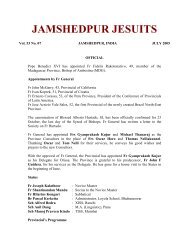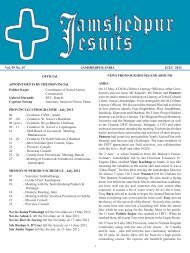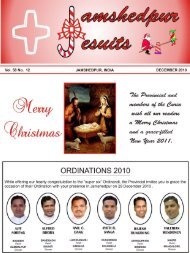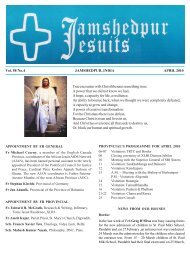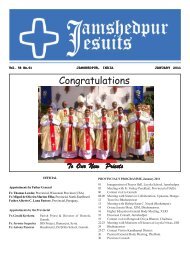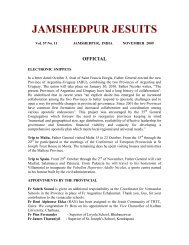Click here to download - Jamshedpur Jesuits
Click here to download - Jamshedpur Jesuits
Click here to download - Jamshedpur Jesuits
Create successful ePaper yourself
Turn your PDF publications into a flip-book with our unique Google optimized e-Paper software.
<strong>Jesuits</strong> - Assistancy<br />
By Gratian Carlo, SJ<br />
Fr General’s concern for “the best<br />
possible formation”: Fr General spoke <strong>to</strong><br />
the members of the JCSA in February 2012<br />
and later wrote <strong>to</strong> Fr Edward, POSA in his<br />
letter of 13 March ‘12 things which have<br />
direct relevance <strong>to</strong> the recommendations<br />
of the Studies Commission Report. He<br />
wrote: ““Considering the emerging needs<br />
of the world Church I see it as of special<br />
importance: a. To provide our men with<br />
the best possible Formation, so that<br />
they will be effective and helpful agents<br />
at the service of the Church and the<br />
people they meet, or <strong>to</strong> whom they will be<br />
assigned. This has particular reference<br />
<strong>to</strong> the Assistancy Houses of Formation<br />
that will need an adequate number of<br />
well-prepared Professors, Superiors and<br />
Spiritual Fathers.<br />
b. To prepare a good number of<br />
capable <strong>Jesuits</strong> in Ecclesiastical, Human<br />
or Natural Sciences. This preparation will<br />
help the Province, the Conference and the<br />
Society at large in responding intelligently<br />
and effectively <strong>to</strong> new challenges and<br />
directions in an increasingly complex<br />
world.<br />
c. To make sure that “Ongoing<br />
Formation” becomes our normal way of<br />
growing as persons and ministers (priests)<br />
and thus supports a creative ministry that<br />
will be able <strong>to</strong> respond <strong>to</strong> the new Frontiers<br />
that emerge from within and from without.<br />
d. To discern in what areas we will<br />
need <strong>Jesuits</strong> who are well-prepared, so that<br />
they can help the Church and our different<br />
ministries in facing new situations and<br />
needs.”<br />
Fourth Commission related <strong>to</strong><br />
formation: JCSA’s concern for formation is<br />
nothing new. In the course of 32 years the<br />
Jesuit Conference of South Asia (JCSA) has<br />
seen four commissions dealing with issues<br />
of formation: 1. Inculturation Commission,<br />
1978; 2. Formation Review Commission,<br />
1992; Integration Commission, 1999;<br />
4. Studies Commission of 2010. JCSA<br />
has been ever conscious that changing<br />
circumstances in a world that is fast moving<br />
require a regular review of the vision,<br />
policies and practices related <strong>to</strong> formation<br />
not only of the formees but also that of<br />
forma<strong>to</strong>rs whether they are Superiors,<br />
professional forma<strong>to</strong>rs/spiritual guides or<br />
teaching staff.<br />
T<strong>here</strong> has been a lot of interest in<br />
the Studies Commission of 2010. This<br />
article is an attempt <strong>to</strong> bring the readers of<br />
Jivan up <strong>to</strong> date on the background and the<br />
present status of the Studies Commission<br />
“The Best Possible<br />
Formation”<br />
- Studies Commission Report<br />
and its follow up<br />
Report and the planned follow up on its<br />
recommendations.<br />
By his letter of 25 Dec 2011, the POSA<br />
(Provincial of South Asia) promulgated<br />
the Report of the Studies Commission.<br />
In the letter he said, “The JCSA Studies<br />
Commission that was constituted on 10 Jan<br />
‘11, successfully completed its work and<br />
submitted <strong>to</strong> me a comprehensive report<br />
on 11 March 11..The Commission was<br />
set up principally <strong>to</strong> explore and examine<br />
ways in which the teaching and studying<br />
of ecclesiastical courses of Philosophy<br />
and Theology could enable us <strong>to</strong> respond<br />
more effectively <strong>to</strong> the exigencies and<br />
imperatives of our Mission in <strong>to</strong>day’s<br />
complex and challenging world.<br />
“Fr Michael Amaladoss (MDU)<br />
graciously accepted the onerous<br />
responsibility of the Convenor while Frs.<br />
George Pattery (CCU), Christie P. Maria<br />
Joseph (MDU), Job Kozhamthadam<br />
(DEL) and Francis Minj (RAN) were active<br />
members of the Commission. The coopted<br />
members of the Commission were Rekha<br />
Chennattu, James Ponnaiah (JDV Faculty),<br />
Lawrence Fernandes (MDU-SN), Francis<br />
Gonsalves (GUJ-VJ), Rudi Heredia (BOM),<br />
Mathew Jayanth (CCU), and Francis<br />
Jayapathy (MDU). All of them have<br />
contributed in diverse ways <strong>to</strong> its collective<br />
findings and recommendations.<br />
What did the Commission do?: “The<br />
Content, the Methods, our Post Graduate<br />
Programmes and Staff were core areas<br />
of concentration, analysis and review<br />
for the Commission. In dialogue with<br />
students and staff, the Commission was<br />
mandated <strong>to</strong> come up with some concrete<br />
proposals <strong>to</strong>wards streamlining, updating<br />
and invigorating the courses at the graduate<br />
and postgraduate levels and creating an<br />
academic climate that would challenge and<br />
propel both the staff and students <strong>to</strong>wards<br />
excellence. It was heartening <strong>to</strong> see a basic<br />
good will coupled with a generally positive<br />
attitude ...in its interactions with the Staff<br />
and students. After situating its work in the<br />
larger perspective of <strong>to</strong>day’s context and<br />
...the assets and strengths already available<br />
in different domains of our Ecclesiastical<br />
Institutes and what it discovered in the<br />
surveys and extensive interactions,.. the<br />
Commission makes some significant<br />
recommendations.<br />
JCSA accepts and POSA promulgates:<br />
“The JCSA in its meeting in Oc<strong>to</strong>ber 2011 in<br />
Pune, deliberated on the Report, and after<br />
placing its unstinting appreciation for the<br />
work accomplished by the members and<br />
the co-opted members of the Commission,<br />
requested the Provincial of South Asia <strong>to</strong><br />
formally promulgate it, so that the benefits<br />
of its recommendations start percolating<br />
in<strong>to</strong> all levels of academic life in the Jesuit<br />
Ecclesiastical Institutes of South Asia.<br />
Obviously not all the recommendations<br />
spelled out by the Commission can<br />
be carried out overnight. Nor will the<br />
multiplication of bodies and structural<br />
creations ensure the implementation of<br />
the spirit of the Commission’s Report. I am<br />
<strong>here</strong>by promulgating and forwarding the<br />
Report <strong>to</strong> the Presidents/Principals/Deans<br />
and the Staff requesting them <strong>to</strong> deliberate<br />
on it and collectively <strong>to</strong> explore ways of<br />
applying its recommendations...”<br />
ADF explains: The POSA referred<br />
<strong>to</strong> an accompanying document from<br />
Fr Gratian Carlo, the ADF (Assistancy<br />
JIVAN: News and Views of <strong>Jesuits</strong> in India NOVEMBER-DECEMBER 2012 13



